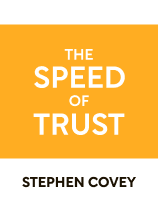

This article is an excerpt from the Shortform book guide to "The Speed of Trust" by Stephen M. R. Covey. Shortform has the world's best summaries and analyses of books you should be reading.
Like this article? Sign up for a free trial here .
What is the meaning of a handshake deal? Are handshake deals a realistic way to conduct business, or are they too risky?
Author and former CEO Stephen Covey wrote The Speed of Trust to illustrate the importance of building high-trust relationships in business and in your personal life. Covey’s great depth of experience lends credibility to his argument for trusting and using handshake deals in business.
Read on to learn why Covey says handshake deals can be less risky than convoluted contracts.
Importance of Trust in Business
Trust is a critical yet undervalued prerequisite for success in the modern world. Trust deepens relationships, creates opportunities, and improves the efficiency of interpersonal interactions. In The Speed of Trust, Stephen M.R. Covey argues that you’ll be more successful in your personal and professional life when you make trust a top priority.
Covey is an expert on trust. He co-founded the FranklinCovey Global Speed of Trust Practice and CoveyLink, which offers educational materials, training, and public speaking events to individuals and organizations looking to maximize their performance by building and leveraging trust. Before co-founding these businesses, Covey was the successful CEO of The Stephen R. Covey Leadership Center at Utah State University.
The Efficiency of Handshake Deals
Trust helps you achieve outcomes more efficiently, hence the title The Speed of Trust. For example, say you are hiring a new babysitter. When she arrives, you spend 30 minutes going over rules, safety protocols, routines, and so on because you don’t yet trust her to know how to care for your kids properly. Once she becomes a regular babysitter, you’ll greet her at the door, tell everyone to have a great time, and leave. The trust you’ve developed with the babysitter increases the efficiency of the exchange.
| “Handshake Deals” Encourage Trust and Efficiency As an example of the efficiency of trust, Covey recounts a $23 billion business transaction between Warren Buffet and Walmart that was resolved in the span of one meeting and a handshake. Because the companies trusted each other, a deal that could have taken months and millions of dollars took only two hours. “Handshake deals” like the one described above may sound risky to many of us, but incomplete contracts like a handshake can be less risky than detailed and lengthy complete contracts. Covey and the Harvard Business Review note that complete contracts are often long and elaborate to eliminate confusion and situations where either party could take advantage of the other. But even the most detailed contract can’t cover every scenario. The impersonal nature of complete contracts can set a tone of mistrust, where both parties look for loopholes or omissions to take advantage of the other. In contrast with complete contracts, handshake deals imply trust between parties and set the expectation that everyone will act with goodwill and respect. This expectation of honorable behavior can be an effective incentive to uphold the spirit of a handshake and eliminate the need for a contract covering every possible scenario. |

———End of Preview———
Like what you just read? Read the rest of the world's best book summary and analysis of Stephen M. R. Covey's "The Speed of Trust" at Shortform .
Here's what you'll find in our full The Speed of Trust summary :
- Why trust is the ultimate key to success
- A roadmap for building and leveraging trust
- An explanation of Steven Covey's “four cores of credibility”






